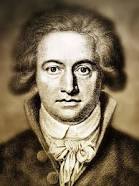Receive Our Newsletter
For news of readings, events and new titles.

The great German, Johann Wolfgang von Goethe (1749-1832), was a man of numerous accomplishments. He was a novelist, a dramatist, a thinker, and a great poet who took German literature out of its narrow parochialism and gave it universal dimensions, just as Shakespeare had done in English literature. In addition to all this, he was interested in the natural sciences, in chemistry, physics, mathematics, astronomy, and in many other scientific pursuits. And he was the first German poet to become interested in the East, in the Arab and Persian cultures, and in the civilizational and cultural aspects of Islam. All this was reflected in his famous poetic collection Westöstlicher Diwan which the late ‘Abd al-Rahman Badawi translated into Arabic. Before this book, Goethe had studied the Qur’an and Persian literature, and had read the poetic story of Laila and Majnoun by the famous Persian poet Nizami. He had also read many Arab poets from the periods before and after Islam.
Goethe’s interest in the literatures and cultures of other nations sprang from the idea he was noted for in his time of aiming to bring together the literatures of all nations.
In 2011, the great Arab poet Adonis was presented with the Goethe Prize, which is awarded once every three years [by his birth city of Frankfurt am Main, celebrating the birthday of Goethe on 28 August]. Other litterateurs and poets from Europe, America, and Asia have been awarded this prize, all of them united by their interest in the cultures of the world. The interest in world cultures is what distinguishes Adonis; for, since his youth, and especially after he joined the group editing Shi‘r [Poetry] magazine in Beirut in the 1950s, he has been ceaselessly interested in world literatures, both ancient and modern. This interest is what has led him to actively take part in demolishing the structure of the classical Arabic poem and laying the foundations of a new structure which is in harmony with the modern age, its problems, its aesthetic and philosophical visions and its rhythms. He did that not only in his poems, but also by expounding his ideas in his many critical writings, which are considered some of the most profound theoretical works on poetics that Arab culture has generated in the 20th century. It is true that there were other poets who joined Adonis in giving new life to the modern Arab poem, but none of them were able to analyse this as theoretically and intellectually as he did. In his book Zaman al-Shi‘r [The Time of Poetry] (1972) Adonis wrote: “I always say that the new Arab poet has to be deeply rooted, to the extent of being alienated.” By this he meant that the truly new Arab poet has necessarily to be deeply rooted in the modern Arab experience in all its comprehensive dimensions, its fire and its flame, to the extent that he is alienated from the usual patterns and modes of expression.
In this context, Adonis adds: “Arabic experimental poetry is, alone, the new poetry; it is, alone, the revolutionary poetry. First, it is not a continuation, nor is it a harmonization or a congruence; on the contrary, it is a difference. Secondly, it is a continuous search for another system of poetic writing. Thirdly, it is a permanent movement in the horizon of creativity; it has no prior methodology, it rather consists of unceasing surprises. Fourthly, it is not an accumulation as is the case in economic and social matters; it is rather a permanent beginning. The values of poetry are not cumulative, they are rather emanational. Finally, it is a permanent movement in a human revolutionary horizon for the sake of a better world and a higher human life.”
Adonis’s theoretical writings exhibit a philosophical and intellectual depth, the like of which we don’t find with other Arab poets. He did not immerse himself in the study of the works of ancient Western philosophers, Greek or Roman, but gave his greatest interest to the philosophers and thinkers who noticeably and basically influenced the modern age. In the foundational period of the modern Arab poem, Adonis was influenced by Nietzsche; and this influence is reflected in his famous poetic collection Aghani Mihyar al-Dimashqi [Songs of Mihyar, the Damascene]. Like Zarathustra, Mihyar aspires to a new world that can rise and be established only on the ruins of the old world. In many of his other works, especially in Al-Muhit al-Aswad [The Black Ocean] (2005), we can see that Adonis had deeply studied modern philosophers and thinkers, in particular French ones such as Foucault, Lévinas, Bourdieu and Roland Barthes.
Adonis did not write plays, as Goethe did. But, like him, he has been interested in music and architecture, and in an aspiration to write ‘the immortal work,’ and this is what he tried to do in the three volumes of Al-Kitab [The Book] in which he made a reading of contemporary Arab history through his interpretation of the old Arab history. He removed from the latter all the characteristics of glory that many people attach to it, and revealed its dark qualities, and aspects of the practices of injustice, coercion, and despotism that characterized various periods and regimes that the Arabs experienced, from the rise of Islam until the fall of the Abbasid Empire. And in the time of inaction, torpor, and rigidity in the life of contemporary Arabs, Adonis has not ceased to stir up their acquiescence: he has severely attacked the old political, intellectual, and religious systems, criticizing them and trying to inspire ambitions to create a new humanist Arab culture, exactly as Goethe had done for German culture three centuries ago. In [The Time of Poetry], Adonis says: “The cultural heritage is not our centre, nor is it a circle that surrounds us – our human presence is the centre and the source.”